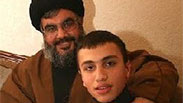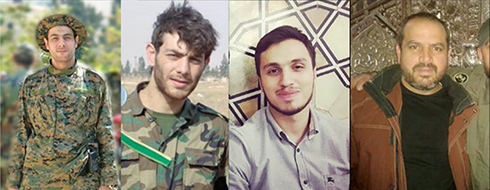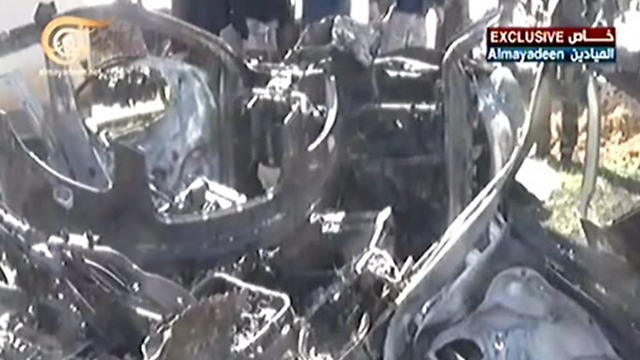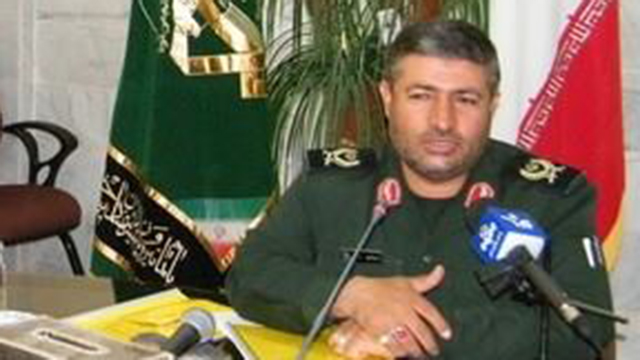
Hezbollah leader Hassan Nastallah with Jihad Mughniyah, who was killed in the attack.
Lebanese official: Israel crossed the red line in war with Hezbollah
Source says if Hezbollah does not respond 'it means it is stuck in Syria's mud and has lost its deterrent ability'; Israeli defense official says Hezbollah response expected, but won't lead to all-out war.
Threats of retaliation against Israel continued Thursday after an airstrike attributed to the IAF in the Syrian Golan killed six Iranian military and six Hezbollah fighters.
A senior security sources in Lebanon who is affiliated with Hezbollah said that the attack, in which Iranian general Mohammad Ali Allahdadi and the son of master terrorist Imad Mughniyah were killed, "shows that Israel has crossed the red line in the security war with Hezbollah, which means the rules have changed."
Hezbollah considers Israel its main enemy. But its fighters in the Syrian province of Quneitra, where the attack took place, have turned a blind eye to the presence of Israeli soldiers across the border there.
Israel has reportedly struck Syria several times during the present conflict, hitting weapons deliveries to Hezbollah, but the group has never acknowledged those attacks. This time the importance of those killed, in addition to Hassan Nasrallah's warning, make the latest raid difficult to ignore.
"It was like an unannounced agreement: 'You ignore us and we ignore you'. Attacks should not rise to full provocation. This attack is a full provocation of Hezbollah," said a security source contacted by Reuters.
"If the group does not respond it means it is stuck in Syria's mud and has lost its deterrent ability."

Hezbollah men killed in the attack: Abbas Ibrahim Hijazi, Razi Ali Dawi, Jihad Mughniyah, Mohammed Issa.
A Lebanese official close to Hezbollah said: "We should expect retaliation from Hezbollah, but it will be done coldly."
An Israeli defense official told Reuters that a response from Hezbollah was expected, but in the form of limited attacks unlikely to lead to all-out war.
"The rules of the game are to respond outside Lebanon unless the Israelis bring war to Lebanon," a source close to Hezbollah told Reuters, explaining that it wants to avoid all-out war.
Lebanese sources reported that Israel contacted the residents of southern Lebanon with an automated phone message warning them not to cooperate with Hezbollah if and when the organization decides to retaliate.
Lebanon has not recovered from its 2006 war with Israel and sending fighters to Syria has stretched Hezbollah's capabilities. In addition, the strike came at a sensitive time for the group.
Hezbollah is trying to contain the damage caused by one of its operatives who confessed to spying for Israel in a case that shattered the group's aura of impenetrability.
The suspected spy is believed to have leaked Hezbollah's plans to avenge the assassination of Imad Mughniyah.
Mughniyah, whose son was killed in the strike last week, was implicated in the 1983 bombings of the US Embassy and US and French barracks in Beirut, and attacks on Israeli targets. Hezbollah accuses Israel of killing him, which Israel denies.
"The group tried to retaliate but was not successful for several reasons. Some of the operations were leaked to the Israelis and others were not possible for technical reasons," said one of the security sources.












